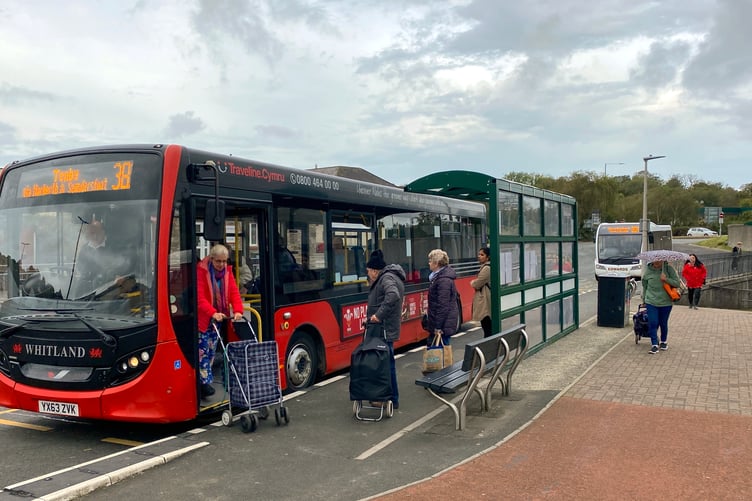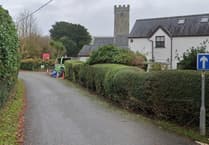Local buses have come a long way from the early 1990s, when you could hop on a late night bus from Tenby to Kilgetty. These days they’re a strictly middle-of-the-day mode of transport, with some villages barely visited, some not at all, and some of the county’s attractions simply off the map for users of public transport.
Now the replacement of the Welsh Government’s Bus Emergency Scheme with a budget-capped £46m Bus Transition Fund is resulting in a further reduction of local services.
With seven operators in Pembrokeshire, plus coastal buses and the new bookable fflecsi services, seasonal variations and term time specials, it all makes for complicated reading as travellers search downloadable timetables for their local stops using the council website. Printed timetables are no longer viable, as service changes happen too frequently.
It’s a vicious cycle: Passenger numbers are well below previous levels, particularly for concessionary card holders, so First Cymru has been tasked by south and west Wales’ local authorities to reduce its bus network in accordance with reduced public funding.
As a result of the cuts, two Carmarthenshire routes - services X28 and X29 - will be withdrawn; reduced bus frequencies will also affect services L1, L2, X11 and X13.
In Pembrokeshire, the frequency of the First Cymru 349 route will drop from an hourly service to every 90 minutes during the winter months.
The 349 route must be one of the most useful in the county as it operates between Haverfordwest and Tenby via Johnston, Neyland, Pembroke Dock, Pembroke, Lamphey, Hodgeston, Jameston, Manorbier and Penally and enables people to travel by bus to Withybush Hospital.
First Cymru’s Managing Director, Doug Claringbold, said: “We share the disappointment customers will feel from the knock-on impact that will have on some routes. We are committed to getting more people to use the bus, and adequate levels of funding are essential where passenger numbers are below the cost of operating services.”
The changes will come into effect on Sunday, October 29 and anyone who relies on bus transport should check timetables before travelling.
Reacting to the news of First Cymru’s cuts, Welsh Conservatives Shadow Transport Minister, Natasha Asghar MS said: “With the Labour Government in Wales cutting bus funding, this was an inevitable and unfortunate consequence. Throw in Labour’s disastrous blanket 20mph speed limits into the mix and bus services will be feeling further pressures.
“This is all whilst bus fares in Wales have increased by 6.3 per cent, but outside of London in England, they’ve gone down by 7.4 per cent.”
In Wales you can get a bus pass for free travel when you’re 60, earlier than England’s state pension age policy, but the Welsh pass is only valid in Wales, offering limited scope for free travel, and with already patchy local services in decline, it will be increasingly useless to many rural and village residents.
Meanwhile, in Haverfordwest, the transport situation’s looking rather scrappy as the county town, having demolished the multi-storey car park and neighbouring bus station, waits for the promised transformational ‘£8m Public Transport Interchange’ to be built, complete with EV charge points and new public toilets. £6.928m of grant funding was awarded to Pembrokeshire County Council from the Welsh Government in 2021. The interchange has allocations from the Welsh Transport Fund of £3,200,000 in 2023-4 and £3,372,000 in 2024-5. On July 3 of this year, Pembrokeshire County Council’s Cabinet underlined its commitment to creating the interchange as they were told all funding has been secured for the development which forms part of the Swansea Bay and West Wales Metro project. They followed the announcement by opening a cashless temporary car park while retendering the project.
But with driver shortages and service cuts, and a new taxi-style app-based ‘fflecsi’ service emerging in the Tenby area as an attempt to fill the gap in rural public transport, what kind of bus service the new hub will be serving is uncertain.
Back in June, Deputy Climate Change Minister Lee Waters described how the Bus Transition Fund would “avoid mass cancellation of services across Wales” as the Welsh Government works together with the Regional Network Planning Teams and operators to “develop a longer-term sustainable funding model that bridges the gap to franchising.”
MP Stephen Crabb commented: “Public transport is vitally important to many people in rural areas. The Welsh Labour Government in Cardiff Bay want more people to walk or cycle, but this just isn’t an option for many people in Pembrokeshire.
“Personally, I think the millions of pounds used to roll out the blanket 20mph limit across Wales would have been better spent supporting local bus services.”
In fact, the 20mph limit poses an additional problem for buses, as explained by Professor Stuart Cole, Emeritus Professor of Transport at the University of South Wales, in the Sunday Supplement programme:
“Buses are built to be traveling with a speed limit of 30mph in urban areas. They can also travel at 10mph in other sections of the route and most buses are now automatic. Their gearing system is designed to travel very slowly at around ten miles an hour and much more quickly at 30mph and above.
“They’re not designed to travel at 20mph. Therefore, the driver is spending more of his or her time adjusting the gearing system.
“More vehicles would be needed to provide the same frequency of service. And that, of course, means more drivers.”
Notices on the Traveline Cymru website state: “Due to significant driver shortages across the transport industry, many operators are having to change their service timetables or cancel services at late notice,” and that “due to the driver shortages, some bus and train services are being cancelled at late notice (usually on the morning on the day of travel).”
Professor Cole concludes: “It’s just not possible in many cases to achieve a higher frequency and a higher number of vehicles traveling than there is now.”
Councillor Rhys Sinnett, Cabinet Member for Resident Services, said the County Council would continue lobbying Welsh Government to increase funding for bus services.
“One of the most immediate concerns is the impact for Pembrokeshire people in accessing employment opportunities,” he said. “With reduced bus services, many residents are facing substantial hurdles in getting to work and this situation threatens not only the financial stability of people and their families but the economic prosperity of the region as a whole.
“We accept these are difficult financial times but we strongly urge the Welsh Government to reconsider its funding decisions so public transportation here and across Wales can be accessible, reliable and viable.”
Concerns have risen recently that April 2024 could see many further reductions of bus services locally and across Wales as subsidies dry up.
For bus times and information, visit www.pembrokeshire.gov.uk/bus-routes-and-timetables .





Comments
This article has no comments yet. Be the first to leave a comment.